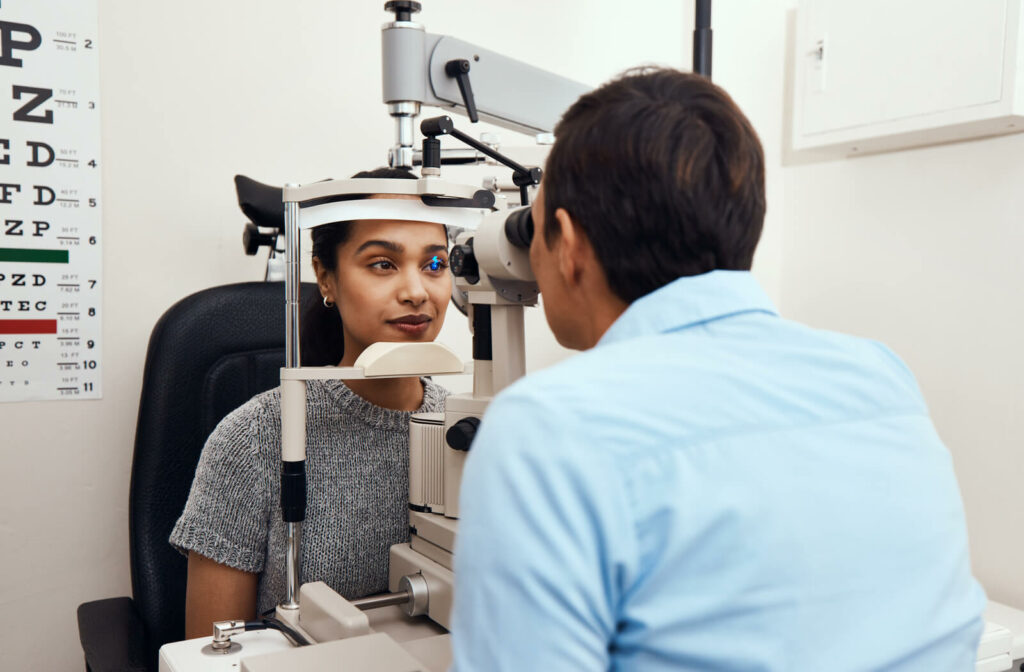Consistency is vital in vision care. Visiting your optometrist for a regular eye exam can help with the early detection and management of potential eye diseases.
But what can you do if you haven’t had an eye exam in years and are looking to schedule one? Let’s explore what to expect during an eye exam and how you can prepare.
Importance of Consistent Eye Exams
Regular eye examinations are essential to help ensure your eyes are healthy and your vision is optimal.
A comprehensive eye examination allows your doctor to:
- Evaluate your vision
- Update your prescription if needed
- Test how your eyes work together
- Check the overall health of your eyes
Your doctor can also check for developing eye diseases. Many common eye diseases can develop without symptoms, so a regular eye exam can assist with early detection, which leads to earlier treatment and management.
As you age, your eyes become more prone to eye diseases like glaucoma, cataracts, and macular degeneration.
Your eye exam is a personalized experience designed around your unique visual needs. Throughout the exam, your doctor will assess your ocular health using diagnostic technology to ensure they capture all the details.
Your vision is ever-changing and developing from a young age through adulthood. A consistent eye exam schedule can help monitor for any irregularities in your vision.
Frequency of Eye Exams
Your eye exam schedule depends on if you’re at a higher risk of eye diseases or experience vision issues. The recommended eye exam frequency for adults and seniors is:
- 18–39 years old: one exam every 1-2 years
- 40–64 years old: one exam every 1-2 years
- 65 and older: one exam every year
Your optometrist may recommend more frequent visits depending on your unique vision needs and how at-risk you are.
Preparing for an Eye Exam
The great thing about an eye exam is that it’s a straightforward process. Your doctor can walk you through the assessment and evaluation of your vision, but what can you do to prepare?
If you haven’t had an eye exam in years, chances are you’ll need a dilated eye exam to make it easier for your optometrist to inspect all the details of your eye. In this case, you should arrange transportation to and from the exam for safety purposes.
For a few hours after your dilated eye exam, your vision may be blurry, and you may be sensitive to light.
Even if you don’t notice a change in your vision, an eye exam can help assess your vision and keep you informed on your eyesight level for medical purposes. A comprehensive eye examination can bring peace of mind and a complete assessment of your ocular health.
Eye exams are about more than your vision. Regular eye exams can serve as a form of early detection and treatment for other severe health conditions. Problems in your eyes can sometimes signify signs of disease in other parts of your body.
Some different conditions that an eye exam can detect:
- Diabetes
- Heart disease
- High blood pressure
- Vitamin A deficiency
- Vascular disease
- High cholesterol
- Autoimmune disease
Your eye exam starts with a conversation with your optometrist, discussing your general health history, vision needs, and symptoms you may have noticed before the exam. Following the exam, your optometrist can answer any questions and give you an updated prescription if needed.
Eye health is a vital part of everyday life. Consistent eye exams can help deliver peace of mind and check for potentially severe vision issues.
Book an Eye Exam Today
If you haven’t had an eye exam in years, now is a good time as any to book an exam. Vision care has evolved over the years, and diagnostic technology makes precise visual assessment more possible than ever. Book an appointment with your optometrist today and get back to consistent eye exams.



